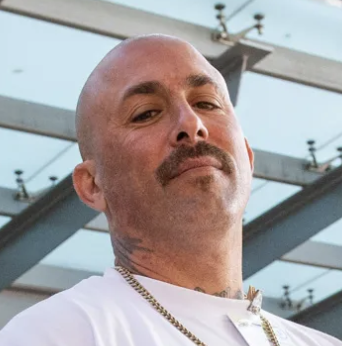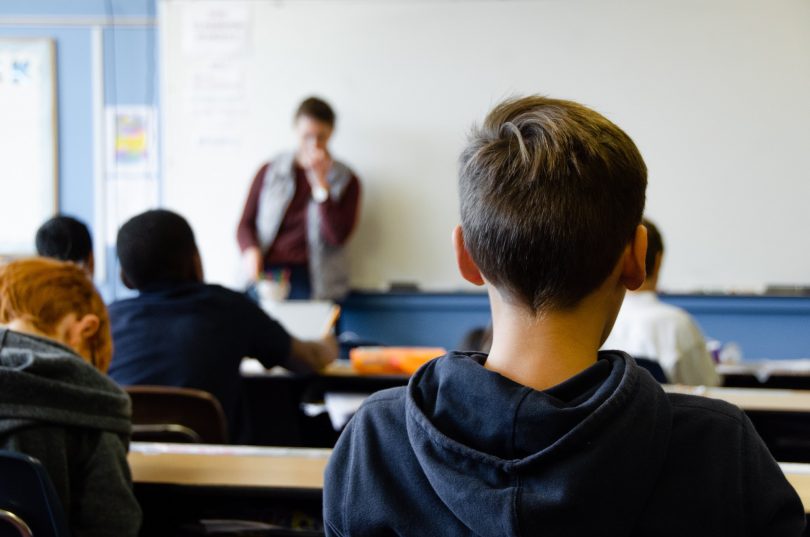By Danny Muñoz, Prison Journalism Project
I don’t remember my mother and father ever being together. My nana was the primary caregiver for me and my older brother. My mom would get her stuff together long enough that my nana would let us go back and live with her, but it never lasted very long. After witnessing poverty, domestic violence and drug addiction, we eventually lived with my nana for good.
I always did well in elementary school because I wanted to make someone proud of me. At the time, that person was my nana. I was in gifted classes and almost skipped second grade, but then I began to get in fights. I was suspended from school for the first time when I was 7 years old.
Although I continued to excel academically over the next few years, I also continued to fight. By the sixth grade, I received my first F. When I got to junior high school, I lost interest in my classes when I noticed that none of my teachers took an interest in me. As my connection to school faded, my peers began to fill the void.
I didn’t feel I could talk to my nana about things. I had no positive father figure. My only interactions with the school counselors happened when I got in trouble and was sent to their office; they never provided any resources, only punishment.
The disconnect and lack of support I experienced from adults at school drove me further toward the negative influences of my peers, making their acceptance of me so much more appealing. No one and nothing deterred me from this path. Only recently have I begun to understand how trauma and my family dynamic growing up contributed to the way I spent the next three decades of my life.
I’m not alone. The kind of trauma I experienced as a young child is alarmingly common in the United States. According to the 2017-18 National Survey of Children’s Health, more than half of Black children and Hispanic children, and 40% of White children, experienced at least one potentially traumatic episode before age 18. Yet very few schools are equipped to recognize their trauma and intervene in ways that help them heal. When a child’s inward turmoil is expressed as distraction, disobedience or fighting with other students, many schools punish the behavior without ever exploring the root causes. There is too much discipline and very little empathy.
I saw my first jail cell at age 14, and by 16 I was arrested on two felony counts — strong armed robbery and attempted armed robbery. I was fortunate to avoid long-term, out-of-state incarceration. As an adult, I spent a significant amount of time in and out of different county jails, taking plea deals on various offenses that otherwise would have sent me to the penitentiary.
In 2016, I was shot point-blank five times in a gang-related incident. After a lengthy physical and emotional rehabilitation process, my interest in learning was finally rekindled. I knew I wanted to make a difference in the lives of young people who were facing similar struggles as me, so I enrolled in a community college.
Now, as a student at University of California, Berkeley, I’ve been conducting original research on adolescent development and the middle school experience. At a time in life when young people are struggling to find their identity and are in need of positive adult role models, the adults they encounter every day in school are often failing them, in part because those adults can’t relate to them.
This past summer, I began serving as a mentor, tutor and teaching assistant for a program that brings in professors from Laney College in Oakland, Calif., to teach community college courses inside the Alameda County Juvenile Justice Center. The program, operated by Restoring Our Communities, is part of the California Division of Juvenile Justice’s “realignment” efforts.
I support these incarcerated youth with their college coursework, writing essays, applying for financial aid and navigating the college’s online learning management system as they acquire college credits inside the facility that they can build upon at a community college once they are released.
It’s not easy to connect with a young person in crisis and earn their trust, but it can be done. Because of my life experience, the training I’ve received and my position as a California Justice Leader — the first AmeriCorps program for formerly incarcerated individuals — I am able to meet these young people where they are. I guide and support their everyday decisions and their larger reentry strategies and goals.
One thing that stands out is the response I get from them in the classroom. They know I can relate: I’ve been where they are. And that makes me effective in this position.
I believe we can do better to vastly improve educational and life trajectories for children in marginalized communities of color.
As I prepare to pursue a master’s in public policy next year, I plan to focus my studies on policies that will help schools evolve, including expanding who they hire. There should be credible messengers like me working in every secondary school, particularly in under-resourced communities of color. State lawmakers should lift blanket restrictions that currently prohibit anyone with a criminal record from working as a K-12 teacher or guidance counselor.
Lived experience makes a huge difference when it comes to developing curriculum, engaging kids in the classroom and understanding that nurturing and encouragement, combined with opportunities for reflection, growth and accountability, are what work.
I’m proud of the incarcerated young people I mentor. They have much to offer, and brighter days are ahead of them. But the kind of work I do needs to start earlier and be embedded in our public schools. That means looking at someone like me and seeing a potential school teacher or guidance counselor.
This essay, was originally published by Prison Journalism Project in partnership with Impact Justice as part of a series of personal essays and profiles highlighting formerly incarcerated men and women who are members of California Justice Leaders and have gone on to become leaders in their communities and fields. Created and operated by Impact Justice, California Justice Leaders is the first AmeriCorps program specifically for formerly incarcerated people.

Danny Muñoz is a writer, a member of Impact Justice’s California Justice Leader program and a student at the University of California, Berkeley, majoring in sociology and minoring in public policy. Muñoz aspires to not only become a leader for the youth in his community but to advocate for policies that create better opportunities for them.

